新人教版高中英语必修2 Unit3 Computers Reading PPT课件
Unit3《Computers》(新人教版必修2)
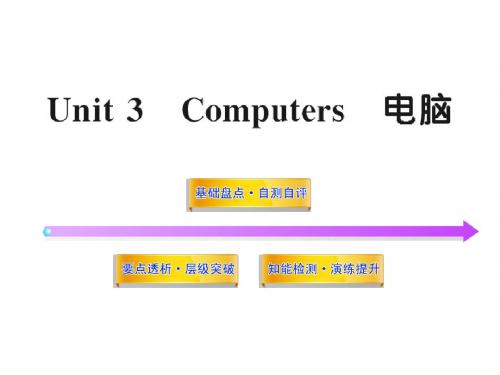
【解析】选B。考查动词时态用法。since表示“自从……”表 示从过去到现在,主句谓语动词要用现在完成时态。
4. With more new applications found in many fields, the computer is now a _____ friend and helper of the human race. A. devoted C. stubborn B. total D. awkward
5. with the help of在……帮助下 After all, with the help of(在……帮助下) my electronic brain which never forgets anything, using my intelligence is what I’m all about!
在某个时间或空间范围内;beyond用于表示时间迟于,晚于; below 低于,不及;少于。
2. By the 1940s the computer had grown as large as a room, and people wondered if it would grow ____ larger. A. quite B. fairly C. any D. very far,
Ⅲ. 句式填空 1. before引导的时间状语从句
I developed very slowly and it took nearly two hundred years
before(过……久才) I was built as an analytical machine by Charles Babbage. 2. consider +宾语+(to be/as)+ n. /adj. At that time it was considered(被看作) a technological revolution and the start of my “artificial intelligence”.
Unit3+Computers+Warming+up+&+Reading+同步练测(人教版必修2)

Unit 3 Computers Section A Warming Up & Reading题组ⅠⅠ. 根据汉语提示完成句子1. The teacher _______________ (正在计算)theaverage point of the class.2. The ad_______________(计划)attract theattention of girls.3. He is a man of _______________(攻于心计).4. He invented a technique for _______________(速算).5. The book _______________(适合于)children.6. 蒸汽机的发展是十九世纪最大的技术进步。
The development of the steam engine was the greatest ________________ of the 19th century.7. 现代人享受高水准的科技。
People today enjoy a high level of __________ _____.8. We beat them _______________(以3∶2).9. He tried his best to ________________ (实现目标).10. He kicked the ball into __________________(球门).Ⅱ. 单项填空1. To my surprise, I found I had a lot _____ with this stranger.A. in needB. in commonC. in debtD. in danger2. Film has a much shorter history, especially when _____ such art forms as music and painting.A. having compared toB. comparing toC. compare toD. compared to3. These instructions should be made more _____, so that the pupils can understand them.A. modernB. simplifiedC. complicatedD. ordinary4. John thinks it won’t be long _____ he is ready for his new job.A. whenB. afterC. beforeD. sinceA. any countryB. all countriesC. any other countryD. all the countries6. It is the _____ of the earth that causes day and night.A. revolutionB. evolutionC. conclusionD. conversation7. To be honest, I don’t like such an/a _____ manner of writing, which is far from the truth.A. honestB. realC. falseD. artificial8. —Have you known Dr Jackson for a long time? —Yes, since she _____ the Chinese Society.A. has joinedB. joinsC. had joinedD. joined9. The new stadium being built for the next Asian Games will be _____ the present one.A. as three times big asB. three times as big asC. as big as three timesD. as big three times as10. I travel to the Binhai New Area by light railway every day, _____ do many businessmen who live in downtown Tianjin.A. asB. whichC. whenD. though11. You can use the glass _____ a vase.A. likeB. asC. forD. to12. Try _____ she might, Sue couldn’t get the door open.A. ifB. whenC. sinceD. as13. Teachers must put the brakes on, _____ it were, when they notice students looking puzzled.A. asB. likeC. toD. for14. He apologized; _____, I won’t forgive him.A. butB. howeverC. soD. thereforeair?—_____A. Come on.B. Take care.C. Go ahead!D. Hold on!16. To get a better grade, you should _____ the notes again before the test.A. go overB. get overC. turn overD. take over17. The enemy had to lay down their arms _____ the great force of our army.A. as a resultB. as a result ofC. resulting inD. resulted from18. My friend Martin was very sick with a strange fever; _____, he could neither eat nor sleep.A. as a resultB. after allC. any wayD. otherwise19. He was _____ blind as a result of the traffic accident.A. totalB. totallyC. completeD. whole20. She has not changed much _____ the years.A. againstB. towardC. uponD. over21. As the story _____, the truth about the strange figure is slowly discovered.A. beginsB. happensC. endsD. develops22. There, far from here, you can find _____ island where an old man lives _____.A. a lonely; lonelyB. a lonely; aloneC. an alone; lonelyD. an alone; alone23. When taking exams, students should work out the problems _____ themselves.A. ofB. toC. byD. with24. This shop will be closed for repairs _____ further notice.A. withB. untilC. forD. at25. If a lot of people say a film is not good, I won’t bother to see it, or I’ll wait _____ it comes out onA. whetherB. afterC. thoughD. until26. Before repairing the water pipe, the worker cut off the _____ of the house pipes t o the water supply.A. gasB. electricityC. heatingD. connection27. Mr Smith, _____ our company, returned to his country last month.A. had been connected withB. had joined toC. connected withD. joined to28. Mother _____ the cakes among the boys when the girls asked for more.A. was separatingB. was handingC. was sharingD. shared29. Learning to _____ makes it easier for one to get along well with others in work and life.A. createB. liveC. shareD. learn30. —_____ when has the country been open to international trade?—1978, I suppose.A. SinceB. InC. FromD. After31. The number of foreign students attending Chinese universities _____ rising steadily since 1997.A. isB. areC. has beenD. have been32. Letterboxes are much more _____ in the UK than in the US, where most people have a mailbox instead.A. commonB. normalC. ordinaryD. usual33. Recently a survey _____ prices of the same goods in two different supermarkets has caused heated debate among citizens.A. comparedB. comparingC. comparesD. being compared34. I began _____ how long it would take to get to theA. workingB. hopingC. calculatingD. remembering35. The loss has not yet been _____ accurately, but it is believed to be well beyond a hundred million dollars.A. calculatedB. consideredC. completedD. controlled36. _____ with many other boys, he likes basketball.A. In generalB. In totalC. In commonD. In particular37. _____ she had time to realize what was happening, she was hit on the head.A. SinceB. BeforeC. WhenD. Until38. Mr Smith owns _____ collection of coins than anyone else I have ever met.A. largerB. a largerC. the largerD. a large39. From then on he _____ interested in art.A. becomesB. have becomeC. becameD. had become40. According to statistics, a man is more than twice as likely to die of skin cancer _____ a woman.A. thanB. suchC. soD. as41. _____ time went on things seemed to get worse.A. WithB. AsC. DuringD. For 42. You haven’t told us your opinion; _____, you can make it clear now.A. butB. howeverC. forD. so43. —Didn’t you have a good time at the party?—Of course I did. As a matter of fact, I had such fun that time seemed to _____ so quickly.A. go byB. go awayC. go outD. go over44. I couldn’t take care of her _____ I was very busy.A. as a resultB. as a result ofC. becauseD. because of45. China is a _____ country, while America is a _____ country.A. developing; developedB. developing; developingC. developed; developingD. developed; developed46. Don’t get off the bus until it _____.A. stopsB. stoppedC. will stopD. stop47. It’s always better to _____ your worries and problems.A. shareB. enjoyC. appreciateD. like48. The young c ouple quarrelled and quarrelled; their connection was beco ming _____.A. goodB. closeC. farD. loose答案与解析Ⅰ. 1. is calculating 2. is calculated to3. a calculating nature4. quick calculation5. is calculated for6. technological advance7. science and technology 8. by three goals to two 9. achieve/realize his goal 10. the goalⅡ. 1. B 本题考查固定搭配。
人教版 必修2 Unit3 Computers Reading 教案
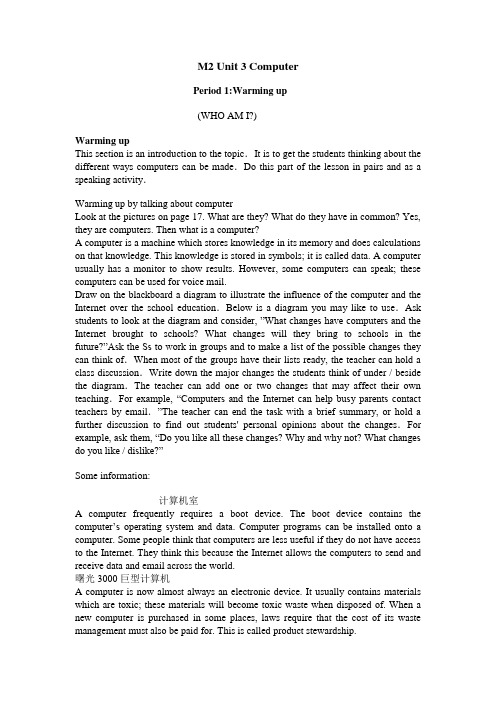
M2 Unit 3 ComputerPeriod 1:Warming up(WHO AM I?)Warming upThis section is an introduction to the topic.It is to get the students thinking about the different ways computers can be made.Do this part of the lesson in pairs and as a speaking activity.Warming up by talking about computerLook at the pictures on page 17. What are they? What do they have in common? Yes, they are computers. Then what is a computer?A computer is a machine which stores knowledge in its memory and does calculations on that knowledge. This knowledge is stored in symbols; it is called data. A computer usually has a monitor to show results. However, some computers can speak; these computers can be used for voice mail.Draw on the blackboard a diagram to illustrate the influence of the computer and the Internet over the school education.Below is a diagram you may like to use.Ask students to look at the diagram and consider, ”What changes have computers and the Internet brought to schools? What changes will they bring to schools in the future?”Ask the Ss to work in groups and to make a list of the possible changes they can think of.When most of the groups have their lists ready, the teacher can hold a class discussion.Write down the major changes the students think of under / beside the diagram.The teacher can add one or two changes that may affect their own teaching.For example, “Computers and the Internet can help busy parents contact teachers by email.”The teacher can end the task with a brief summary, or hold a further discussion to find out students' personal opinions about the changes.For example, ask them, “Do you like all these changes? Why and why not? What changes do you like / dislike?”Some information:计算机室A computer frequently requires a boot device. The boot device contains the computer’s operating system and data. Computer programs can be installed onto a computer. Some people think that computers are less useful if they do not have access to the Internet. They think this because the Internet allows the computers to send and receive data and email across the world.曙光3000巨型计算机A computer is now almost always an electronic device. It usually contains materials which are toxic; these materials will become toxic waste when disposed of. When a new computer is purchased in some places, laws require that the cost of its waste management must also be paid for. This is called product stewardship.In some countries old computers are recycled (melted down) to get gold and other metals. This is dangerous, because this procedure releases the toxic waste into the water and soil.Computers become obsolete quickly. Very often they are given away and new ones replace them within two or three years. This makes the problem worse. Computer recycling is thus common. Many projects try to send working computers to developing nations so they can be re-used and will not become waste as quickly. Computer jargon 计算机行话Computer jargon means words to do with computers and surrounding topics. Knowing what these words mean can help you know more about computers. Some people use these words to impress other people (Also known as buzzwords). Examples of jargon:Bit - The smallest data unit, can either be a “0.” or a “1.”.Byte - unit of data. See also Kilobyte, Megabyte, Gigabyte and NibbleCPU –Central Processing Unit, Another name for processorData - Information stored on a computerDisk - A place to store data.Email - Electronic mail.GHz - Gigahertz. Used often incorrectly to describe the speed of a processor. But with some 2.4 GHz processors faster than 3.6 GHz ones, it is clear that it is just a salesman trick.Load - Get data from a diskNibble - Half a ByteSave - Put data on a diskRAM – random-access memory(随机存取存储器), the more the better.USB - Universal Serial Bus(通用串行总线,一种简化了插接多种附件的薄型插座)WWW - World Wide Web, part of the InternetPeriod2-3 Pre-reading & ReadingPre-readingThis can be a continuation of the Warming Up.Let the students discuss the questions set out in the Student's Book.1. Questioning and answering What do you know about computer?●Electronic machine capable of performing calculations and other manipulations of various types of data, under the control of a stored set of instructions. The machine itself is the hardware; the instructions are the program or software. Depending upon size, computers are called mainframes, minicomputers, and microcomputers. Microcomputers include desk-top and portable personal computers.●A multi-function electronic device that can execute instructions to perform a task.●A device that accepts information, processes it, and supplies an output. A computer usually contains memory, a control unit, arithmetic and logical units, and a means for input and output.●a programmable hardware component that is controlle d by internally stored programs and that can perform substantial computations (including arithmetic andlogic operations) without human intervention. A computer typically consists of one or more processing units, memory units, and associated peripheral input and output devices.●Related to automation and electronic data processing. The Library of Congress commonly classes most computer-related books in HF5548, QA75-76, Z52, T385, and some TK ranges.●a machine for performing calculations automaticallycalculator: an expert at calculation (or at operating calculating machines)●A computer is a device or machine for making calculations or controlling operations that are expressible in numerical or logical terms. Computers are constructed from components that perform simple well-defined functions. The complex interactions of these components endow computers with the ability to process information. If correctly configured (usually by, programming) a computer can be made to represent some aspect of a problem or part of a system. If a computer configured in this way is give2. Discussing and sharing How have computers changed our lives?Someday soon, if you haven’t already, you’re likely to plug into the computer network nation growing in our midst. Computer terminals, or small computers connected via modem (a modulator/demodulator circuit for encoding/decoding computer chatter) to ordinary telephone lines, should be as ubiquitous as the telephone itself. They’re a much more useful and humane tool than the phon e, and with corporate America behind them the networks will be everywhere----changing our lives more than any technology since the automobile.Joining a computer network is the same as joining a community. Small systems are like villages, where new members are formally welcomed. The larger networks, the Source and CompuServe, for example, are cities-anonymous, full of life and events, but difficult to fit into.II. ReadingThis is the purpose of the reading and so it is important that the students learn to use all the clues in the text to help them understand the gist of what they are reading.So encourage them to look at the pictures and the heading and guess what the text might be about.Then ask the class to read the passage silently.Make sure the students have the chronology of the development of computers in their minds.Ask them:1. Listening and reading to the recording of the text WHO AM I?Turn to page 18 and listen and read to the recording of the text. Pay attention to the pauses, pronunciation and intonation of the native reader.2. Reading aloud and underlining expressionsNow we are to read the text once again and underline all the expressions in the text. Put them down into your notebook after class as homework.Collocations from WHO AM I?begin as…, a calculating machine, be built as…, follow instructions from…, sound simple, at the time, a technological revolution, write a book, make…work, solve problems, become huge, had artificial intelligence, go back to…, the size of…, go by,change size, become small and thin, get quick, stand there by oneself, be connected by…, share information by…, talk to…, bring…into…, deal with…, communicate with…, serve the human race3. Reading, identifying and settlingAttention, please! It is time to skim the text one more time and identify the difficult sentences. Try analyzing the structures of the difficult sentences and discuss them among your group members. You may also put your questions to me for help.Chat (online)(在线)聊天To chat is to talk about ordinary things that are not very important. You can chat to one person or to many people. People also use this word now for parts of the Internet where we can talk with many different people at the same time. Usually, you chat on the internet in a chat room or messaging service like AOL(American On-Line) Instant Messenger (AIM), Yahoo Messenger, or MSN Messenger.IV. Closing down by doing comprehending exercisesTurn to page 18 and in pairs do the comprehending exercises No. 1 and 2. Reading and transferringScan the text for information to complete the table below, describing the development of computer.In 1642In 1822In 1936In 1960sIn 1970sAnswer key:1642: The computer began as a calculating machine.1822: The Analytical Machine was made by Charles Babbage.1936: Alan Turing wrote a book to describe how computers could be made to work.1960s: Computers had new transistors and became smaller.1960s: The first family of computers connected to each other.1970s: Computers were brought into people's homes.Now: Computers connect people all over the world togetherV.Explanation1.in common: for or by all of a group 共同的;共有的;共用的。
2020-2021学年高中英语云南同步教案:Unit 3 Computer阅读(人教新课标必修2)
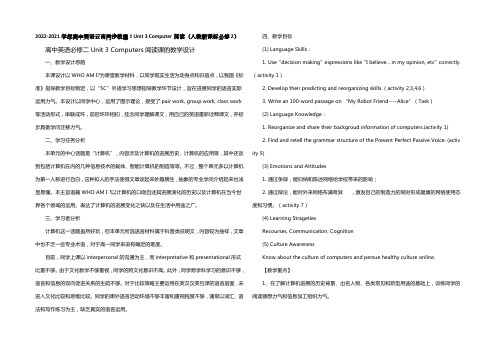
2022-2021学年高中英语云南同步教案:Unit 3 Computer阅读(人教新课标必修2)高中英语必修二Unit 3 Computers阅读课的教学设计一、教学设计思路本课设计以WHO AM I?为课堂教学材料,以同学现实生活为动身点和归宿点,以我国《标准》指导教学目标制定,以“5C”外语学习思想指导教学环节设计,旨在进展同学的语言实际运用力气。
本设计以同学中心,运用了图示理论,接受了pair work, group work, class work 等活动形式,串联成环,前后环环相扣,挂念同学理解课文,用自己的英语重新诠释课文,并初步具备学问迁移力气。
二、学习任务分析本单元的中心话题是“计算机”,内容涉及计算机的进展历史、计算机的应用等,其中还谈到包括计算机在内的几种信息技术的载体、智能计算机的制造等等。
不过,整个单元多以计算机为第一人称进行自白,这种拟人的手法使得文章谈起来妙趣横生,抽象的专业学问介绍起来也浅显易懂。
本主旨语篇WHO AM I ?以计算机的口吻自述其进展演化的历史以及计算机在当今世界各个领域的运用。
表达了计算机的进展变化之快以及在生活中用途之广。
三、学习者分析计算机这一话题虽然好玩,但本单元所选语言材料属于科普类说明文,内容较为抽样,文章中也不乏一些专业术语,对于高一同学来说有确定的难度。
目前,同学上课以interpersonal的沟通为主,而interpretative和presentational形式比重不够。
由于文化教学不够重视,同学的跨文化意识不高。
此外,同学跨学科学习的意识不够,语言和信息的双向促进关系的生疏不够。
对于比较策略主要运用在英汉汉英互译的语言层面,未进入文化比较和思维比较。
同学的课外语言活动环境不够丰富和重视程度不够,通常以词汇、语法和写作练习为主,缺乏真实的语言运用。
四、教学目标(1) Language Skills:1. Use “decision making” expressions like “I believe... in my opinion, etc” correctly.(activity 1)2. Develop their predicting and reorganizing skills.(activity 2,3,4,6)3. Write an 100-word passage on “My Robot Friend----Alice”(Task)(2) Language Knowledge:1. Reorganize and share their backgroud information of computers.(activity 1)2. Find and retell the grammar structure of the Present Perfect Passive Voice. (activ ity 5)(3) Emotions and Attitudes1. 通过争辩,能归纳和陈述网络给学校带来的影响;2. 通过辩论,能对外来网络布满奇异,激发自己的制造力的同时形成健康的网络使用态度和习惯。
人教版高中英语必修二(Book 2 Unit 3)

人教版高中英语必修二(Book 2 Unit 3)Unit 3 Computers核心单词1. common adj. 共同的,普遍的;常见的常用结构:in common 共有,公用(在句中多作状语)have nothing/little/a lot/something in common (with) sb. 与某人没有/许多/有些共同之处in common with 和……一样common sense/knowledge 常识common welfare 公共福利易混辨析common/ordinary/usual/normalcommon 指"共有的,公共的;共同的;常见的"。
反义词为rare。
common作"普通的"讲时可与ordinary换用。
如"普通人"也可以说成common people。
ordinary 意为"普通的,平淡无奇的",指没有什么特别的地方。
usual 意为"平常的,通常的,一向的",含惯例之意。
normal 意为"正常的"。
Jane and I have nothing in common.=I have nothing in common with Jane. 我与简毫无共同之处。
The problems are common to all societies. 这些问题是所有社会的通病。
In common with many young people, he prefers pop songs.和许多年轻人一样,他喜欢流行歌曲。
He is in ordinary clothes. 他穿着平常的衣服。
We meet every day at the usual place. 我们每天在往常那个地方见面。
单项填空Harry visited the bookstore every week. He became sucha______________customer that the bookseller gave him some books as presents.A. commonB. normalC. usualD. average解析:选C。
高中英语Unit3ComputersPeriodFourGrammar—ThePresentPerfectPassiveVoice练习(含解析)新人教版必修2
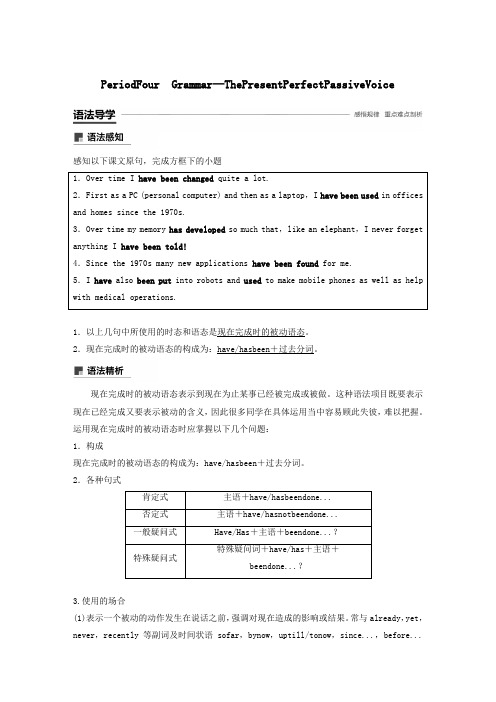
PeriodFour Grammar—ThePresentPerfectPassiveVoice感知以下课文原句,完成方框下的小题1.Over time I have been changed quite a lot.2.First as a PC (personal computer) and then as a laptop,I have been used in offices and homes since the 1970s.3.Over time my memory has developed so much that,like an elephant,I never forget anything I have been told!4.Since the 1970s many new applications have been found for me.5.I have also been put into robots and used to make mobile phones as well as help with medical operations.1.以上几句中所使用的时态和语态是现在完成时的被动语态。
2.现在完成时的被动语态的构成为:have/hasbeen+过去分词。
现在完成时的被动语态表示到现在为止某事已经被完成或被做。
这种语法项目既要表示现在已经完成又要表示被动的含义,因此很多同学在具体运用当中容易顾此失彼,难以把握。
运用现在完成时的被动语态时应掌握以下几个问题:1.构成现在完成时的被动语态的构成为:have/hasbeen+过去分词。
2.各种句式肯定式主语+have/hasbeendone...否定式主语+have/hasnotbeendone...一般疑问式Have/Has+主语+beendone...?特殊疑问式特殊疑问词+have/has+主语+beendone...?3.使用的场合(1)表示一个被动的动作发生在说话之前,强调对现在造成的影响或结果。
人教版高中英语 必修二 Unit3 Computers ---Reading 课件
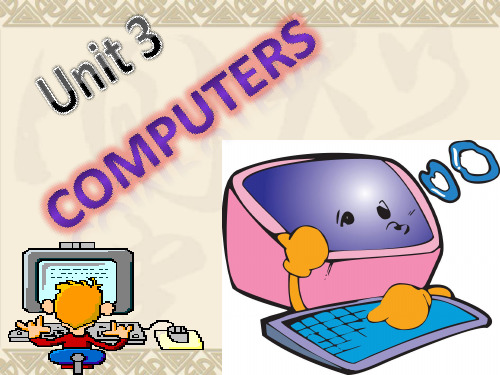
2 What roles do computers play in the life of human beings?
What are the new applications of the computer?
Homework
1. Finish exercise 1 on page 56. 2. Read the text again after calss
and underline the difficult points. 3.Write down your opinions about the question in the discussion.
communication
finance
Trade space rockets
mobile phones medical operation robots
The _d_e_v_e_lo_p_m__e_n_t and the applications of computers.
Development
• do housework though you are outside
I will become an intelligent remote(智能遥控) which can be used to control household appliances, such as TV, air-conditioner and light. And I also can help people do housework though they are outside. In a word, I can make people's life more convenient and comfortable.
人教新课标必修二英语Unit 3Computers【教学设计】

Unit 3 Computers本堂课包括Warming up 和Reading 两部分。
他们是语言知识和文化意识的输入过程;是语言技能、情感态度和学习策略的培养过程,也是语言输出过程。
在整个教学过程中,它是培养学生阅读能力的主要过程,教学重点是阅读技能的培养、交际能力及情感态度的提升。
Warming up部分根据每个人对电脑的看法不同让学生就“Do you like computer?”进行小组探究和讨论,从自身实际出发谈论自己的看法,有助于激发学生对于整个单元的学习兴趣。
Reading部分(Computers)主要讲述的是电脑的发展史,通过一系列问题的设置让学生能够在全面理解文章的基础上提高信息处理、加工和学习的能力。
Knowledge objectives:掌握以下词语和句型:Calculate,sum, solve, simplify, artificial, intelligence, revolution,reality, totally, application, finance, in common, over time, as a result, from···on, so···that. Ability objectives:训练学生一定的阅读技巧,使他们掌握一些有效的学习策略,从而提高阅读速度和篇章理解的准确性,并养成一定的自主学习能力;培养学生快速阅读的能力、捕捉信息的能力及运用语言进行交际的能力。
Emotion objectives:通过对“computer”的学习,启发学生思考电脑给我们带来的影响,从而以一种正确的方式利用电脑和网络资源;另外通过电脑的发展历程让学生意识到科技对生活的影响。
1. 教学重点:1.了解计算机的发展过程,进一步认识计算机的演变以及对人类的影响。
2.训练学生的阅读技巧,提高学生阅读速度和理解能力。
人教版_高中英语_必修二_unit_3_computersUsing_language
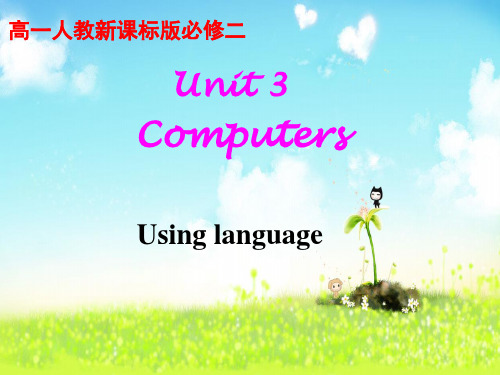
2. Listen to the whole text and write
down the main idea in one sentence. Two students are talking about information technology.
3. Listen to Part A and fill in the chart. Part A What does IT include? What is the most popular form of IT? computers, books, radio and TV books
L: Really! Well, I never. D: Question number 2. Which is the most popular form of IT in the world? L: Well, that must be computers this time. D: No, it’s books. Think of all those people in developing countries without computers. Their only form of IT is books! L: Oh dear! I’m not doing very well.
Disadvantages You cannot write to friends. It is not always accurate. You cannot watch a film. Sometimes it is out of date.
Welcome to our world!!
different kinds of android types android
人教版高中英语必修2精选Unit 3 ComputersTask课件ppt
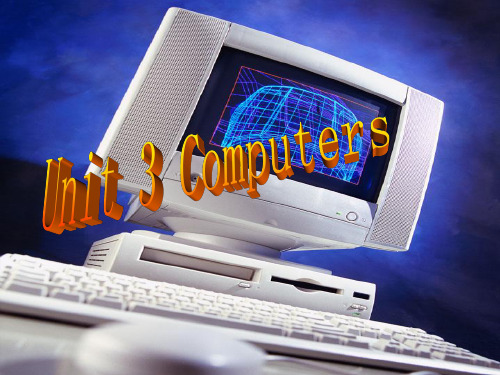
1940 Computers had grown as large as a room.
ห้องสมุดไป่ตู้
s
1960s The first family of computers was
connected Computers
to were
used
in
offices
F
2. People began to realize that the computer got
cleverer and quicker with time passing. T
3. The computer began to serve the human race
since it was brought into people’s homes. F
Guess!
A handbag?
A toy?
Guess more:
I am very old now. I was born in China. Many people used me for calculating in the past, but now I am a bit lonely because they don’t like me now.
1) What’s the main idea of the text? A. The computer wants to find “who he is”. B. The functional change of the computer. C. The computer becomes popular around the world. D. The history of the computer.
人教版高中英语必修二 unit 3 computers Reading课件3

6A.. robot 5B.. laptop
机器人
time order
手提电脑
3C.. universal machine 通用机
1D.. calculating machine 计算机器
2E.. analytical machine 分析机
4F.. PC
个人电脑
Discussion
• Do you want to have a computer or a robot? If you can just choose one of them, which do you prefer? List your reasons.
ቤተ መጻሕፍቲ ባይዱ
keyboard 键盘 mouse 鼠标 host 主机
the most important tphaertpoafrt of a computer which
a computer
looks like a television
monitor 显示器 printer 打印机 speaker 音响
components of a computer
Do you know who I am?
abacus
[`æ bəkəs] n. 算盘
Riddle B (谜语):
I am very small. I can be used for calculating. In our class, a lot of students use me to solve maths problems. Do you know who I am?
Tips: 1. We can use a computer to … 2. It is made up of some parts, such as…
人教新课标高中英语必修二Unit 3 Computers教案(1)

Unit 3 ComputersI 教学内容分析本单元的中心话题是“计算机”。
Warming up部分用图片呈现了计算机发展的历史,让学生通过看图讨论的方式了解计算机的发展和演变过程。
Reading部分编者采用了拟人化的手法向读者介绍了计算机的发展历程。
Comprehending部分包括三个练习,分别从事实层面、分析层面和拓展层面考察学生对文章的理解和运用情况。
Learning about language部分的活动突出了形容词和副词用法的区别,并扣本单元的语法点(现在完成时的被动语态)。
Using language部分的听力材料中谈论的是信息技术的几种形态或载体(包括收音机、书籍、电视和电脑;在读说活动中,通过智能机器人参加足球赛的经历向读者介绍了计算机运用的另外一个例子。
Learning Tip部分鼓励学生利用图书馆,网络等课外资源学习英语,有利于学生使用资源策略。
Reading for Fun 部分是一首活泼风趣的小诗,以拟人的方法让机器人自述了心声:尽管日夜忙碌,为人服务,但它相信自己和真实的人类没什么两样。
II.教学重点和难点1.教学重点(1) 本单元的生词和短语;(2)通过学习本单元,使学生了解计算机的发展历程,及其在当今社会的广泛运用;(3)鼓励学生用英语表达自己的观点,进行简单的推理和做出决定。
2.教学难点(1) 教会学生通过时间的先后顺序来表达一件事;(2) 使学生了和掌握现在完成时的被动语态的用法;(3) 指导学生按类别归纳整理词汇,让学生学会有效地记忆词汇的方法;(4) 引导学生发现本单元重点语言结构,让学生自己发现并感悟相关的语言规律,在学习过程中培养语感。
III.教学计划本单元分六课时:第一课时:Warming Up, Pre-reading, Reading第二课时:Language points第三课时:Learning about language第五课时:Speaking, Reading, WritingIV.教学步骤:Period 1 Warming Up, Pre-reading, ReadingTeaching Goals:1. To know something about computers.2. To learn and talk about computers.Teaching Procedures:Step 1. Leading-inPurpose: To activate the Ss and arouse them to talk about the importance of computers in modern society.Ask Ss whether they have a computer or not and what they use it for. Let them talk as much as possible.Step 2. Warming UpPurpose: To get Ss to think about the differe nt ways computers can be made.Pair workGet Ss to look at the following pictures, and then ask them to answer the questions.A huge computer A PCA notebook computer A calculatorAn abacus1. What are they?2. What do they have in common?3. What is a computer?Suggested Answers:1. a huge computer, a personal computer, a notebook computer, a calculator, an abacus2.(1) to be used to calculate;(2) operate by human beings;(3) they are all artificial;(4) show figures in a certain way.3. A computer is a machine which stores knowledge in its memory and does calculations onthat knowledge. This knowledge is stored in symbols; it is called data. A computer usually has a monitor to show results. However, some computers can speak; these computers can be used for voice mail.A computer is now almost always an electronic device. It usually contains materials whichare toxic; these materials will become toxic waste when disposed of. When a new computer is purchased in some places, laws require that the cost of its waste management must also be paid for. This is called product stewardship.Step 3. Pre-readingPurpose: To activate Ss’ interest about computers.Group workAsk Ss the following questions and encourage them to say more.1.How have computers changed our lives ?2.What do you know about computers ?Suggested Answers:1. They’re a much more useful and humane tool than the phone , and with corporate America behind them the networks will be everywhere--- changing our lives more than any technology since the automobile.2. A multi-function electronic device that can execute instructions to perform a task.A device that accepts information, processes it, and supplies an output. A computer usually contains memory, a control unit, arithmetic and logical units, and a means for input and output.A programmable hardware component that is controlled by internally stored programs and that can perform substantial computations (including arithmetic and logic operations) without human intervention. A computer typically consists of one or more processing units, memory units, and associated peripheral input and output devices.Step 4. Reading1. SkimmingPurpose: 1. To get a brief understanding of the text.2. To train the students’ listening ability.First, let Ss skim the text and then listen to the recording of the text. Pay attention to the pauses and pronunciation.2. ScanningPurpose: To get Ss to have some details in the text.Now we are to read the text again and underline all the expressions in the text. Writethem down in your notebook.3. Further ReadingPurpose: To get Ss to get more details about the text.Read the text again and find the information to complete the table, which describes thedevelopment of computer.1642: ___________________________________________________1822: The Analytical Machine was made by Charles Babbage.____: ___________________________________________________1940s: ________________________________________________________: The first family of computers was connected to each other.1970s: ___________________________________________________Now: ___________________________________________________Step 5. RetellPurpose: To have a deep understanding of the text.Ask Ss to use the chart above to retell the development of the computer.One possible version:I, a computer, was a calculating machine in 1642 in France. Then I was built as an Analytical Machine in 1822, which was a technological revolution. I became a “universal machine” in 1936 to solve any mathematical problem. I was not very big at first then I became huge, the size of a large room before I was made smaller and smaller.Getting new transistors, later very small chips I changed my shape. I was connected with other computers and turned out to part of a network in the early 1960s. In 1970s I was brought into people’s homes, and came the Internet.Step 6. Homework1. Write a short passage about the development of computers.2. Finish Ex1 (P19), Ex2 (P20).Period 2 Language pointsStep 1 Word studyGroup workDivide Ss into four groups and ask them to discuss the following words.1. common(1)most widely known; ordinary:Eg He is a common sailor.(2)have nothing/little/something/ a lot in commonEg At first, I think we only had one thing in common, but suddenly I felt we had a lotin common.Eg The two brothers had everything in common in their manners, but the two sisters have little in common.Eg They have nothing in common with one another.2. analytical分析的Eg The scientist analyzed the milk and found it contained too much water.3.technology 科技;技术Eg With the development of technology, we will cure AIDS sooner or later.4.calculate(v.)1)to use numbers to find out a total amount, distance, etc. 计算;核算We haven’t really calculated the cost of the vacation yet.2)to guess sth by using all the information available 推测,估计It is impossible to calculate what influence he had on her life.5.As time went by, I was made smaller.随着时间的推移,我被弄得越来越小。
巧设悬念 不断激趣——以人教版高中英语必修2 Unit3 Computers阅读教学为例
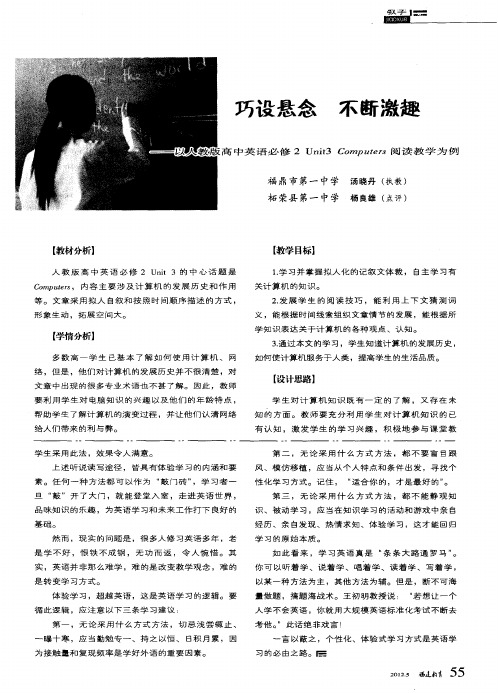
品味 知 识 的乐 趣 ,为 英 语学 习和 未来 工 作 打 下 良好 的
基础。 然 而 ,现 实 的 问题 是 ,很 多人 修 习英 语 多 年 ,老
是 学 不 好 , 恨 铁 不成 钢 , 无 功 而 返 , 令 人 惋 惜 。 其 实 ,英 语 并 非 那 么 难 学 ,难 的 是 改 变 教学 观 念 ,难 的 是 转 变学 习方 式 。
!
巧设 悬念
不 断激趣
高 中 英 语 必 修 2 Un t C mpu e s 阅 读 教 学 为 例 i3 o tr
福 鼎市 第一 中 学 汤晓丹 ( 执教) 柘 荣县 第一 中学 杨良 ( 雄 点评)
【 教材分析】
人教 版 高 中英语 必修 2 Unt 的 中 心 话 题 是 i 3
t l? ie t
生 感 ,对 未 知 的 事 物 产 生 强 烈 的 探 究 欲 望 。 教 师 可 结 合 教 学 内容 ,利 用 各 种 方 式 , 如 游 戏 、 预 测 、 设 问 等 , 制 造 各 种 悬 念 ,逐 步 引 导 学 生 深 入 学 习。 男 外 ,悬 念 还 可 以和 小组 合 作 学 习等 方 式相 结合 ,加 强 师生 互 动 、生 生 互 动 ,培 养 学 生 自主 合 作 学 习及 分析 Байду номын сангаас
【 设计思路 】
学 生 对 计 算 机 知 识 既 有 一 定 的 了 解 ,又 存 在 未 知 的 方 面 。 教 师 要 充 分 利 用 学 生 对 计 算 机 知 识 的 已 有 认 知 ,激 发 学 生 的学 习兴 趣 ,积 极 地 参 与 课 堂 教
高考英语 Unit3《Computers》知识与要点课件 新人教必修2
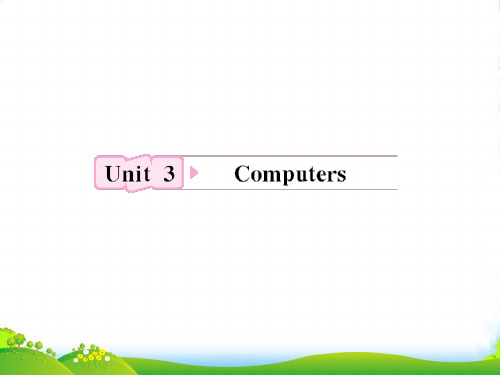
重点 短语
in common,go by,so...that...,in a way,make up,after all,with the help of...,watch over,deal with,as a result, from...on,human race
重点 句型
1.And my memory became so large that even I couldn't
2.solve vt.解决;解答 归纳拓展 solution n.解决,解决方法;解答,答案,常与介词to 搭配。 find a solution to sth.找到解决……的方法 soluble adj.可以解决的;可以解答的 Can you solve the word puzzle? 你能解答这个字谜吗?
A.But B.Anyhow C.Somewhat D.Anywhere 【解析】 句意为:我们要成功地改变法律的可能性不 大,但不管怎样(尽管如此),尝试还是很重要的。anyhow“不 管 怎 样 , 尽 管 如 此 ” ; somewhat“ 有 点 , 有 几 分 ” ; anywhere“不管哪里,在任何地方”。 【答案】 B
【链接训练】
We waited for them to give us the ________ to move.
A.symbol
B.sign
C.signal
D.mark
【解析】 symbol“象征,符号”;sign“记号,征兆,
迹 象 ” ; signal“ 信 号 ” ; mark“ 标 志 , 标 记 ” 。 由 句 意
Her strange behaviour aroused our suspicions. 她不寻常的举动引起了我们的猜疑。 The price of wheat has risen since last summer. 自从去年夏天以来麦子的价格已经涨了。 He raised his eyes from his work. 他停下工作抬头看。
高中英语人教版必修二unit3Reading
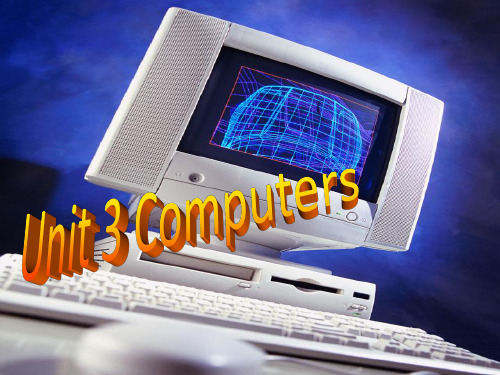
computer
click
keyboard
Who am I ?
While-reading(1):
1. Who is the speaker in this story? A computer.
2. What’s the main idea of this passage? A. The development of computers. B. The development and use of computers. C. A machine which is simple-minded. D. Computers may replace human beings.
Guess!
A handbag?
A toy?
What English words do you know about computers?
host
computer
⑥
screen
④
③
⑤
monitor
②
① speaker
keyboard mouse
Guess more:
I am very old now. I was born in China. Many people used me for calculating in the past, but now I am a bit lonely because they don’t like me now.
d. The computer began to simplify
difficult sums.
A. a. b. c. d.
B. ห้องสมุดไป่ตู้. c. a. d.
C. d. a. c. b.
【精选】人教版高中英语必修二课件:Unit 3 Computers —— Reading
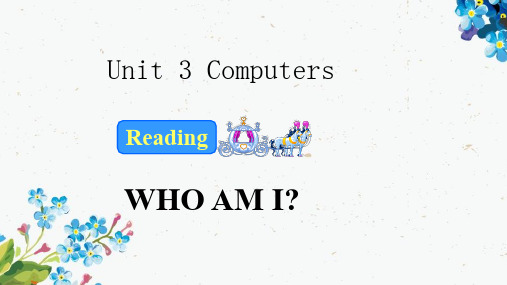
3.Underline the topic sentence of each paragraph.
Para 1: Over time I have been
changed quite a lot.
Para 2: Para 3:
These changes only became possible as my memory improved. Since the 1970s many new applications have been found for me.
Chat
Play computer games
Learn computer skills
. Send e-mails
See movies
Search informationBiblioteka Listen to music
Entertainment
advantages
we can communicate with friends listen to the music see films & watch news play games do shopping save a lot of time do a lot of useful things
The computer had grown as large as a room.
1960s
Computers were used in offices and homes.
Computers connect people all over the world Now together.
analytica ulniversal
There is unhealthy informaion on the net.
人教高一英语必修二 Unit3 Computers-Reading
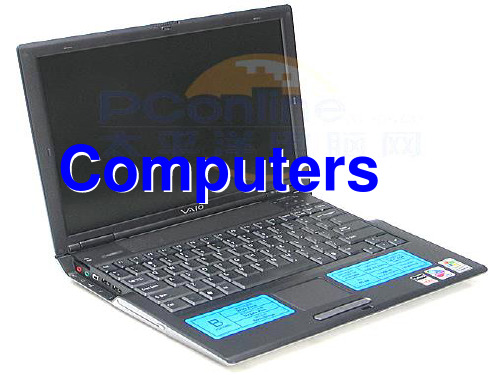
RECORD CARD
HUA FEI
Ability
Excellent style and movements; Olympic
Performance in sWtaonnddaerrdful turns, dives,
78th Olympics circles and dances
Prize won
它结构相同的复合形容词还有:
absent-minded open-minded narrow-minded single-minded strong-minded weak-minded
心不在焉的 虚心的, 没有偏见的 心胸狭窄的 一心一意的 意志坚强的 ห้องสมุดไป่ตู้能的, 愚蠢的
2. artificial adj. 人工的,人造的 artificial flowers/limbs/pearls 假花/假肢/假珍珠 artificial intelligence 人工智能
Charles Babbage invented an Analytical machine in 1822. 10. Who was the computers’ real fathAelra?n Turing.
Read the passage and then fill in the chart.
with与how连用。 What do you do with
How do you deal
the wounded?
with
8. I love being used to connect
people who aren’t close enough to
speak to each other. enough 的用法: 作名词 e.g. Enough has been done for him. 作形容词 (通常放在名词前) e.g. We have not enough food.
- 1、下载文档前请自行甄别文档内容的完整性,平台不提供额外的编辑、内容补充、找答案等附加服务。
- 2、"仅部分预览"的文档,不可在线预览部分如存在完整性等问题,可反馈申请退款(可完整预览的文档不适用该条件!)。
- 3、如文档侵犯您的权益,请联系客服反馈,我们会尽快为您处理(人工客服工作时间:9:00-18:30)。
He was used in offices and homes.
Find the word or expression for each of the following meanings from the text.
2) My real father, Alan Turing, … 3) I was always lonely standing there by
myself, until in early 1960s they gave me a family connected by a network.
Listen again and answer the questions.
make people lazy; unhealthy information; pollute the environment; …
Read and answer the questions.
1. Who is the speaker in this story? 2. Write down three sentences from the
revolution complete change g, etc
network connected computer system
simplify to make things easier calculate to find the answer using numbers as a result so; therefore mobile can be moved easily from place to
I often use a computer to …. I sometimes use it to … and I never use it to …
Debate
Is computers good or bad for human
beings?
For
Against
have great power; make our lives more colorful and more convenient; …
place
solve to work out the answer to a problem goal one’s aim or purpose
to travel around an area to find out explore about it totally completely anyhow anyway finance activity of managing money
Warming up and reading
Look at the following pictures and say their English names.
calculator
abacus
PC huge computer (personal computer)
laptop
PDA (personal digital
1. Where was the speaker born in 1642? In France.
2. What happened to the speaker after nearly two hundred years?
He was built as an Analytical Machine by Babbage. 3. What was the speaker called in 1936?
story to support your idea.
1. Who is the speaker in this story? A computer.
2. Write down three sentences from the story to support your idea. 1) I was built as an Analytical machine by Charles Babbage.
What English words do you know about a computer?
host computer
speaker
screen mouse monitor keyboard
Discussion
What can computers be used to do in daily life?
assistant)
robot
What do you think the future computer development will be?
What do they have in common?
• I think that… 1.They can be used
• In my opinion… for calculating.
Check the sentences are true or false.
1. In 1642 I began as a calculating machine F
How do you use computers and the Internet?
or
1. Help to do homework 2. Play computer games 3. Send e-mails 4. Listen to music 5. See movies 6. Chat 7. Search for information 8. Do shopping 9. Learn computer skills
• I believe that… 2.They can deal with
• What’s your reason?
• Why do you think so?
maths problems. 3.They are our friends. 4.They are useful and
helpful.
